| Article ID | Journal | Published Year | Pages | File Type |
|---|---|---|---|---|
| 2831101 | Molecular Immunology | 2013 | 10 Pages |
•We identify proteomic biomarkers in JMJD3-attenuated THP-1 cells.•Establish the IPA based functional proteomics in JMJD3-attenuated THP-1 cells.•Suppress key inflammatory regulators such as TRIM5, GPx, GMFG in JMJD3-kd cells.•Find JMJD3-based molecular targets and crucial pathways in inflammatory signaling.
JMJD3, a Jumonji C family histone demethylase, plays an important role in the regulation of inflammation induced by the transcription factor nuclear factor-kappa B (NF-κB) in response to various stimuli. JMJD3 is a histone-3 lysine-27 trimethylation (H3K27me3) demethylase, a histone mark associated with transcriptional repression and activation of a diverse set of genes. The present study assessed stable JMJD3 knockdown (KD)-dependent proteomic profiling in human leukemia monocyte (THP-1) cells to analyze the JMJD3-mediated differential changes of marker expression in inflammatory cells. To analyze the protein expression profile of tumor necrosis factor-alpha (TNF-α)-stimulated JMJD3-kd THP-1 cells, we employed matrix-assisted-laser-desorption/ionization-time-of-flight mass spectrometry (MALDI-TOF MS). Additionally, Ingenuity Pathways Analysis (IPA) was applied to establish the molecular networks. A comparative proteomic profile was determined in TNF-α-treated both of JMJD3-kd THP-1 cells and THP-1 scrambled (sc) cells. The expression of tripartite motif protein (TRIM5), glutathione peroxidase (GPx), glia maturation factor-γ (GMFG), caspase recruitment domain family, member 14 (CARMA2), and dUTP pyrophosphatase were significantly down-regulated, whereas heat shock protein beta-1 (HspB1) and prohibition were significantly up-regulated in JMJD3-kd THP-1 cells. The molecular and signaling networks of the differentially expressed proteins in JMJD3-kd THP-1 cells were determined by IPA. The molecular network signatures and functional proteomics obtained in this study may facilitate the suppression of different key inflammatory regulators through JMJD3-attenuation, which would be crucial to evaluate potential therapeutic targets and to elucidate the molecular mechanism of JMJD3-kd dependent effects in THP-1 cells.
